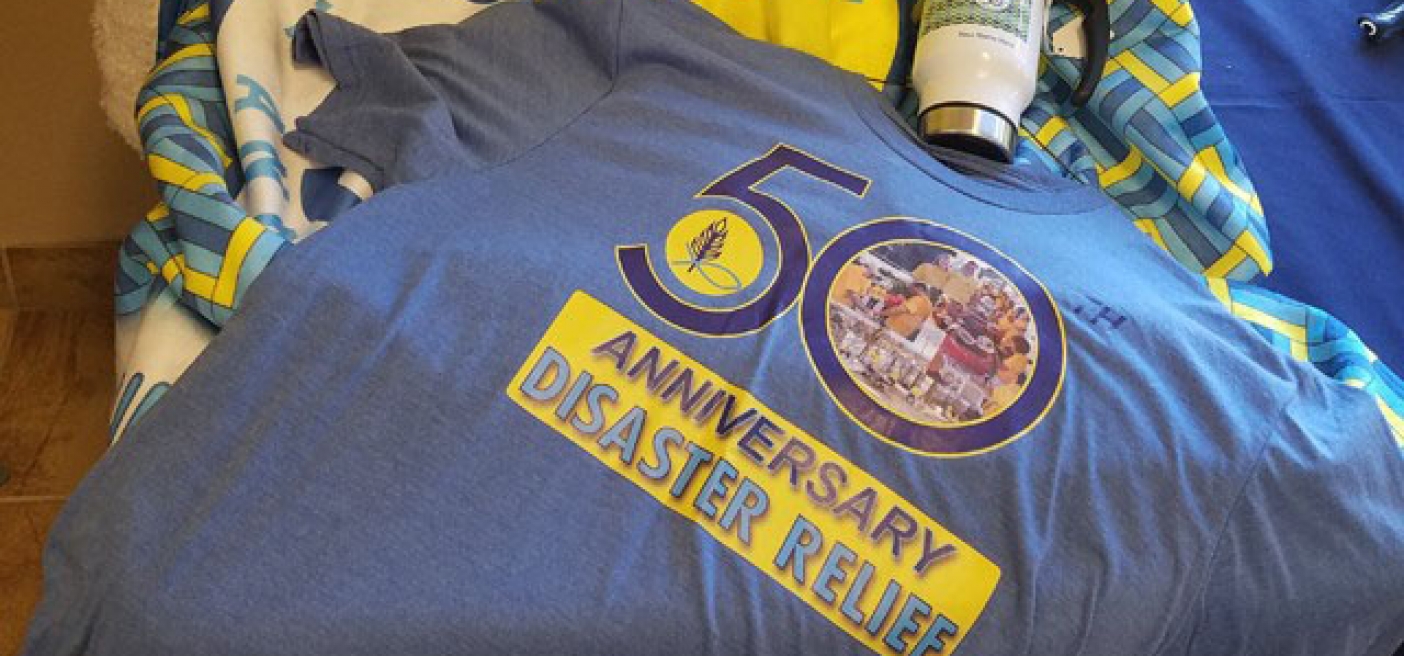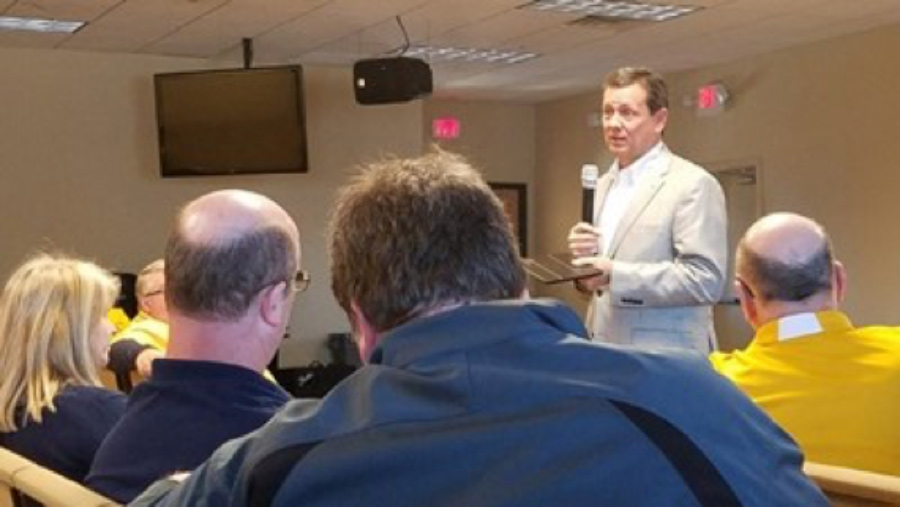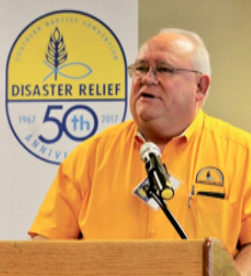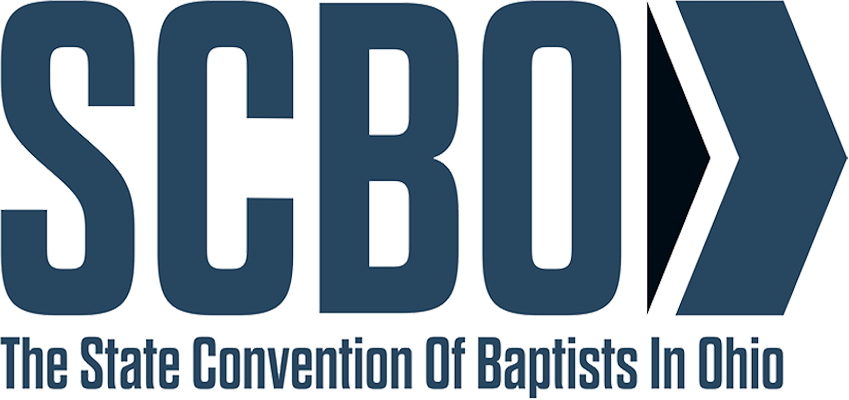DR Leaders Mark 50 Years of Ministry, Eye Future

DENTON, Texas (BP) -- Southern Baptist Disaster Relief leaders throughout North America met for their annual "Round Table" meeting and to commemorate the 50th anniversary of the founding of SBDR.
Representatives from nearly all the state Baptist conventions participated in the Jan. 23-27 event at Camp Copass in Denton, Texas. Portions of the week focused on celebrating five decades of ministry efforts, looking at the present state of the ministry and preparing for the future.
"Fifty years represents a significant event for us," said Mickey Caison, the executive director of SBDR at the North American Mission Board.
"Over those 50 years, we've responded to thousands of disasters, both domestically and internationally," he noted. "As part of that, we've seen thousands of people come to Christ out of that environment of damage and destruction. As we move through that process, we're able to see people come to faith. Because there were no Southern Baptist churches in their community, there was an opportunity for our associations and state conventions to start churches."
On Jan. 23, the group heard from Bob Dixon and John Lanoue, who participated in the first SBDR response following Hurricane Beulah in 1967. Using campcraft skills from the Royal Ambassadors ministry, the men turned one-gallon cans into miniature stoves (called "Buddy Burners") to prepare hot meals for people impacted by that year's most intense hurricane.
"It's a great reminder of the faithfulness of those who started the work and the faithfulness of those who have continued the work for a very long time," said Gaylon Moss, the disaster relief coordinator for North Carolina Baptists.

NAMB President Kevin Ezell speaks to Southern Baptist Disaster Relief leaders during a conference celebrating the 50th anniversary of the denomination's DR work.
Photo by Jane Rodgers/Southern Baptist TEXAN
Roundtable participants also spent significant time debriefing the past year's major deployments, including two major flood events in Louisiana and last fall's response following Hurricane Matthew. NAMB and state leaders discussed how responses can improve from those experiences.
The group also discussed ways to involve more Southern Baptists in training events.
"We looked at the need for more online training and 'just-in-time' training,'" Caison said. "Not a lot of volunteers are willing to give you a whole weekend to get away and be a part of a training event. If they're not going to do it that way, how are we going to get the training material, safety material and those kinds of things in their hands?"
Sam Porter, the Baptist General Convention of Oklahoma's state disaster relief director, said SBDR has left a legacy among Southern Baptists in mobilizing a wide variety of volunteers for Gospel work.
"It is a unique vehicle for people with Christ in their hearts and a passion to serve others that is set on 'go' whenever the world falls a part in some place," Porter said. "It especially gives opportunities to those who may not feel confidence about their knowledge of the Bible or they don't do well singing. Even though we all know they do, they may not feel like they have something to give. When they get to use their God-given gifts or their learned talents in disaster relief tasks, like using a chainsaw or cooking, they realize those abilities can be used greatly to impact the world for Christ and set up the opportunity for someone to hear the Gospel."
Yet Porter and other SBDR leaders acknowledged that for the ministry to be most effective, Southern Baptists must mobilize new generations of leaders. Roundtable participants spent much of their meeting time discussing ways to get more Generation X and Millennial volunteers involved.

Mickey Caison, executive director of Southern Baptist Disaster Relief (SBDR) for the North American Mission Board, spoke to state Baptist disaster relief leaders in Denton, Texas, as they gathered Jan. 23-27, for their annual "Round Table" meetings and to celebrate the 50-year anniversary of SBDR.
Photo courtesy of Southern Baptist Disaster Relief
"The volunteer pool we have is beginning to age out," Caison said. "Medically and physically they are not able to go and do the kind of work that they've done in the past. We're looking at how we better engage Gen X and Millennials in the ministry."
New volunteers are particularly needed because Caison says SBDR's ministry success has brought with it much responsibility. SBDR's national partners spoke at the roundtable about the need for Southern Baptists to be prepared to deploy faster and with more volunteers. Red Cross, the Federal Emergency Management Agency (FEMA), the National Voluntary Organizations Active in Disaster (VOAD) and the Salvation Army all sent representatives to the roundtable.
"While they all affirmed us and encouraged us in our ministry, they did remind us that we have great responsibility," Caison said. "Red Cross reminded us that it is incumbent on us to be responsive and available. Because of our partnership with them, they can't do their job without us. They wanted us to continue to strive for stronger, faster responses, as well as longer sustainability in those responses."
Don Gann, who leads disaster relief efforts for Mississippi Baptists, remains hopeful about the ministry's next 50 years.
"I hope we can be flexible enough to continue to mobilize Southern Baptists to reach people, and at the same time, do it in a way that will meet the needs of the people who have been affected and also reach a new generation of Southern Baptists," said Gann, who led the steering committee for the roundtable but couldn't make the event because of the heavy storms that hit Mississippi the prior week.
"It's a great challenge -- but it's a good one. I can't wait for it!"
NAMB coordinates and manages Southern Baptist responses to major disasters through partnerships with 42 state Baptist conventions, most of which have their own state Disaster Relief ministries.
Southern Baptists have 65,000 trained volunteers -- including chaplains-- and 1,550 mobile units for feeding, chainsaw, mud-out, command, communication, child care, shower, laundry, water purification, repair/rebuild and power generation. SBDR is one of the three largest mobilizers of trained Disaster Relief volunteers in the United States, along with the American Red Cross and The Salvation Army.
Tobin Perry writes for the North American Mission Board.
